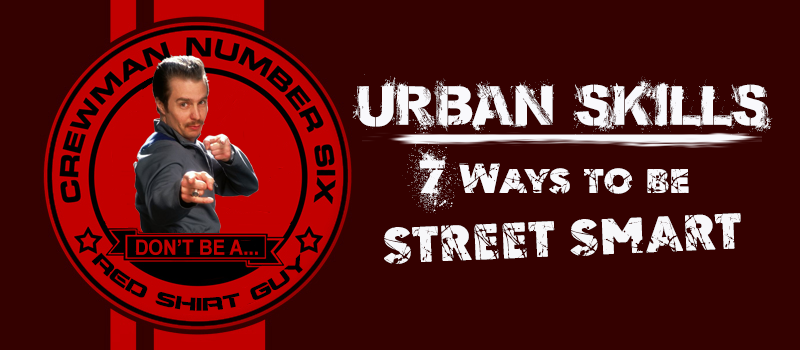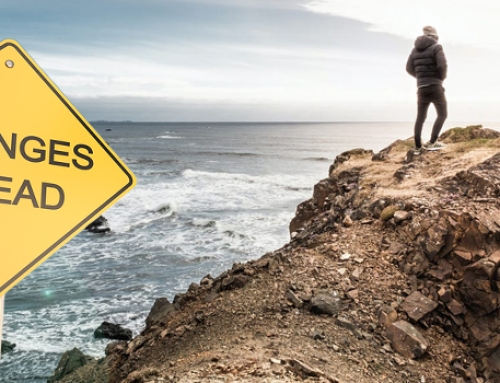No one and I mean NO ONE wants to be Crewman #6… If you aren’t familiar with the term… let’s try those Trekkies out there. In a catastrophic world, you don’t want to be caught with a red shirt on… comprehende?!?
Alright, straight up in plain English then. When crap hits the fan in this world, you don’t want to be that guy that is bound to die first. And for the majority of us who live in the more populated areas of that world, this potential event of us being first is inevitably higher.
Whether you feel like Crewman #6 that has a Red Shirt on or not we need to gear ourselves to that fact of civil unrest is increasing in the streets we walked around in peace just a couple years ago. This isn’t a doomsday or a pessimistic view on things where you and I live. For some odd reason, there are people pushing our way of life to resemble more that of Mexico than that of the grand ol’ US of A.
The stats all show it, there is no way around it, crime in our cities is growing. We’ve all seen the news reports – of shoplifters targeting stores and are taking just enough not to get arrested, or the drive-by shootings are hitting more innocent people or the rampant theft of vehicles, tools, and toys are all getting worse in the major cities. Even those who live in the semi-calm suburbs are seeing an uptick in crime and general maliciousness occurring now more than in times past. Whether it is a cycle or here to stay permanently, the trends are getting pretty undeniable.
For our article today, I am going to use the term “Urban Skills” in a slightly different way than you normally see it, namely, to how you can make your way in an urban atmosphere by becoming more proficient at street smarts. Or, put another way, tips for the development of a street smart attitude in an ever-increasing dog-eat-dog situation WITHOUT having to learn and earn them through the school of hardknocks.
Street Smarts: What it’s all ’bout!
Now first let’s start out with a definition of what it means to be “Street Smart”. We’ve all heard it is the ability to develop the traits of “someone who can think on their feet, be a problem solver that has good common sense, who knows how to handle bad situations come what may, and has the skills necessary to function and adapt to where they live”. Being “Street Smart” is the knack of recognizing as accurately as possible what is happening around you; the ability to predict or anticipate what is going on in the world and who is apt to do something “unexpected”; to bring whatever may happen around to your benefit or advantage OR know how to avoid it altogether. This involves having the physical and mental tools to survive within that type of world and place.
Now color me this:
Imagine in the not too distant future there is chaos and calamity all-around your humble abode (due to tornados, anti-fa protests, earthquakes, massive unemployment, the devaluing of the dollar, another “Plandemic” – whichever the cause may be) and even though you stay close to home, you must venture eventually out to go to your job, or take your kids to school, and to periodically make a trip to the grocery store. And yet the moment you step outside you can feel the tension of it all as thick as three week old clam chowder.
What are you to do?
(Sub) Urban Skills for the Street Smart Savvy
1. Trust your gut and stay “cold”: The military term it keeping your head on a swivel. Just pay attention to what’s going on around you. If something seems “off”, back away or alter your route. Don’t be ashamed to admit that you are feeling uneasy even if you feel foolish after the fact. Bad vibes are bad vibes so trust your instincts and you will be fine.
2. Evaluate risk factors: Headed to unfamiliar area? Dealing with someone unknown to you? Attempting to do something that you have never done before? Evaluate the risks so that you are prepared. Dress to blend in, get ready for the ‘right hook” or inevitable “left turn”. Don’t make yourself an easy target by carrying a lot of obviously expensive electronics, and don’t call excessive attention to yourself. If the area in under siege, or even the slightest bit sketch, evaluate your need to even go there. Is it worth the risk? Is it worth the reward?
3. Evaluate your home base security and create a buffer zone: Make sure the outdoor area of your home is well lit and that the foliage and shrubbery is trimmed around the perimeter of your home site. Whether it is from a camera angle or looking out with the naked eye, try to eliminate any blind spots that could cause you a disadvantage. The last thing you want is a convenient hiding place for the punks right there on your property. Take the steps necessary to protect AND not draw extra attention to where you are at.
4. Situational awareness: Teach yourself to actively look for signs of threats and dangers. With anyone you are dealing with. In the real hard times it is tough to know who you can trust with your life, or your livelihood. Hope for the best, but plan for the worst. Have those you allow into your circle remain loyal to you and you to them. Know who you are dealing with, and if you don’t take the extra precautions how they may choose to act.
5. Know your area neighborhood: Reach out as you can and get to know your neighbors and the members of your community. As the times get harder, it is always better to be able to gather around you like minded people with the same aim and goal as you. It has been said that no man is an island, and even when you are isolated it is always best to look for that group you can become a part of that builds you up, instead of tears you down. Local clubs, church groups, and hobby enthusiasts are a great place to start.
6. Every day carry items: Increase your ability to defend yourself and deflect attention. In our modern society, the need to have on your person individual protection items has fallen out of practice, however, having a pocket knife, a gun in a holster, or a simple carrying of a whistle, or pepper spray can be a good consideration. As you now would not go anywhere without your phone or wallet, as times get more rough think about adding a few more pocket essentials.
7. Be prepared for the unthinkable: In normal society, and under civilized circumstances this is not even in the wheelhouse of consideration. But, when push comes to shove and a particular situation becomes a life or death question – what are you to do? Measure your Mete beforehand. Think through scenarios that you would be able to stop (or not stop) another person in their tracks, and halt for good their actions (and their breathing)? This goes deep into who you are and what you are willing to do to protect yourself and those you love. Be prepared for the unthinkable BEFORE it becomes the undoable.
What To Do If You Feel Threatened
Attitude is everything and can make a huge difference. Confidence is mesmerizing and can tip the tide of what will happen to our favor. Do not give off signals that you feel vulnerable and threatened. Nope – don’t do that in your body language, in your tone or in your language you use. On the other hand, do not purposely walk in to a dangerous situation. It is always best to avoid the confrontation if you have to, and fight when you must. Planning ahead with give you a quicker step or a faster reaction time over others.
Overall TakeAway
Having street smarts takes common sense and the ability to deal with all kinds of people in a myriad of contentious situations. Know yourself your capabilities, talents, and skills is a priority. Put into muscle memory your actions, and reactions to given situations. Decide beforehand what you need to do, and how you need to carry yourself, because it is those who don’t and leave themselves unawares that are the Crewman Number Six with that blazing Red Shirt on. While having well honed street smarts is essential for urban dwellers, street smarts are also an important skill for those in a rural community and remote areas as well.
There is no better time than now to practice a street smart and street savvy attitude. Above all, remain safe. Godspeed and God Bless!






